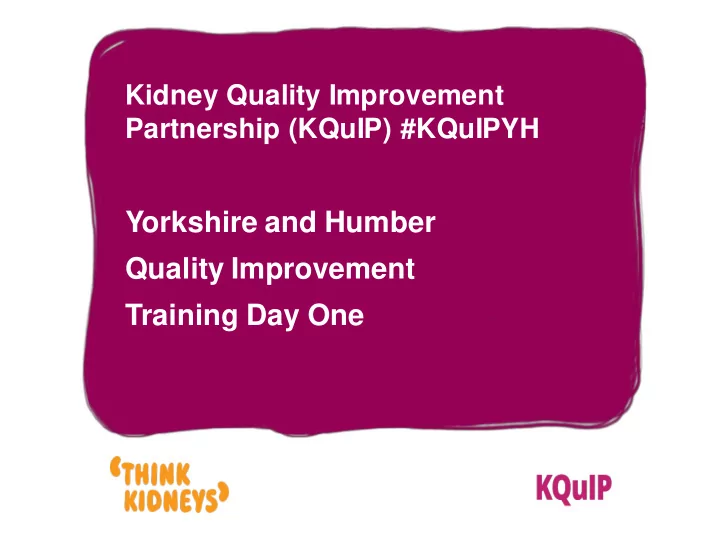

Kidney Quality Improvement Partnership (KQuIP) #KQuIPYH Yorkshire and Humber Quality Improvement Training Day One
Kidney Quality Improvement Partnership (KQuIP) #KQuIPYH Introductions and welcome Ron Cullen, CEO Renal Association
Housekeeping and survival Fire alarms Car Park … Toilet location… and exits… Photos… Breaks… Mobiles 3
Why are you here? Building QI capability
Kidney Quality Improvement Partnership (KQuIP) #KQuIPYH What are your aims for today? Ron Cullen, CEO Renal Association
What are your aims for today • Individually think – what do I want out of today? • In a group of 3 – what do we want out of today • In the room – what do we want out of today?
Kidney Quality Improvement Partnership (KQuIP) Building a Quality Improvement Team – stakeholders and patients Leeanne Lockley, RA QI Programme Manager
Building a QI team – Why?
Building a QI team – Who? Who can influence? Who has connections? Who has subject expertise? Who has lived experience? Who is good at communicating? Who has done this before? Who has an interest? Who can challenge? Who is seldom heard?
Building a QI Team – Avoid hierarchy!
Building a QI team – Involve patients WHY? … Because it is the right thing to do They bring a different set of skills and insights to the programme A new and different way of working and thinking Change of language in meetings – common ground Bringing lived experience to the conversation – challenges some assumptions Filter into practice in units – patients as assets A new experience for patients – translates to improved Quality of Life | 11
Building a QI team - Co-production Co-production means working together to do something It is about people with different views and ideas coming together to make things better for everyone Co-production is about people who use services, carers and people who run services working together as equals Being equals means nobody is more important than anyone else BUT …..it has to be in new ways | 12
Building a QI team – How to involve patients • Be clear about what you are asking from them – find out what they might bring and want to gain • They will have skills which are currently untapped – ask them • Don’t invite just one – that’s tokenism • Don’t invite them just because – it has to be two way beneficial • Try and gain a representative view which will feed back into their KPA or patient groups • Patients who dialyse may not want to attend meetings on day off • Think of your young adults – I know of plenty – all on twitter and have strong views on what they want • Don’t make excuses – there is no right time – the sooner the better • No jargon – no hierarchy – equals
Building a QI team – Who are your stakeholders? Who can influence? Who has connections? Who has subject expertise? Who has lived experience? Who is good at communicating? Who has done this before? Who has an interest? Who can challenge? Who is seldom heard?
Stakeholder Grid
Group work • Take 5 mins to plot your stakeholders on the grid
Engaging and communicating with stakeholders
Engaging and communicating with stakeholders Communication • Clear, constant message with appropriate level of information • Be open and honest with an authentic tone • Show passion and connection • Provide goals, purpose and direction • Have clarity, transparency, measurement and accountability Design a communication plan • Provide opportunities for communication • Use different modes • Provide the ‘what’ and ‘why’ as well as the how
Group work
Group Work • Take 10 minutes to discuss in teams how you will communicate your project to your stakeholder group / your patients / each other • Remember – this is a working document and should be referred to at every team meeting • Be prepared to share with the rest of the room
Kidney Quality Improvement Partnership (KQuIP) Building a QI Team? What QI skills do you need in your team? Who do you know?
Skills analysis
Skills analysis
Group Work • 5 minutes to individually complete the skills analysis • 5 minutes to share with your results with your team
Kidney Quality Improvement Partnership (KQuIP) Agreeing a shared purpose and scope Ron Cullen
Agreeing a shared purpose
The NHS Change Model The NHS Change Model comprises eight component parts The components are used to develop and a support a quality improvement project Together, the total delivers a complete picture of how to manage and deliver quality improvement
Our Shared Purpose
Group work • Take 20 mins start to develop your shared purpose • Be prepared to shared your shared purpose with the rest of the room
Kidney Quality Improvement Partnership (KQuIP) Scope
Scoping Exercise What is in? OUT What is out? IN Boundaries Deliverables List everything
Scoping Exercise
Group work Take 10 mins to work on your Project Scope Be prepared to share with the rest of the room
Kidney Quality Improvement Partnership (KQuIP) Time Frames of project and what needs to be achieved Ron Cullen
Timeframes
Group work • Take 15 mins to fill in your action plan • At lunch, arrange a time with Leeanne to visit your unit for QI/ project support
Recommend
More recommend